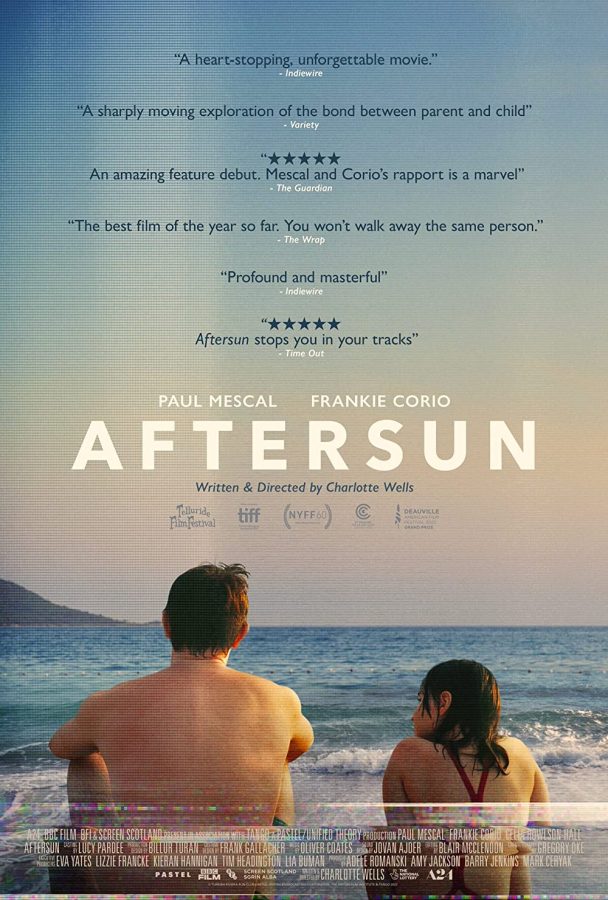“Aftersun” review: For those who have ever wished they could stop time
April 28, 2023
Imagine time goes still every time you close your eyes, think a happy thought, and hold your breath hard enough. Everything suspends midair; everybody goes rigid. You can sit in one moment and hold it as long as you can hold your breath. But if you stay in that one specific moment in time you may get stuck in a moment, frozen in time, and left choking for air.
There is a beauty to the pace of life and the fleeting nature of it all. Charlotte Wells’ “Aftersun” takes the time to stop and smell the flowers when a lot of people pass them by. It comes together like a memory with peaks and lows that replicate the turbulence of life in the sun. It paints unbearable grief with sweet-smelling laughter and sunny glimpses of home video memories, elements that make the culminating end all the more devastating.
The film follows the lens of an eleven-year-old Sophie (Frankie Corio), interacting with her father, Calum, on their family vacation to a resort in Turkey. Wells is able to tap into specific adolescent emotions, behaviors, and environment-fueled desires like Sean Baker does in his “The Florida Project” and Mike Mills in his “C’mon, C’mon”. There is a richness to films that capture a uniquely youthful perspective featuring a child in the lead, building their small world and the big world around them. Wells weaves unseen glimpses of Calum’s quiet moments and breakdowns into the suggested happy-go-lucky video footage from their trip to Turkey. “Aftersun” captures Sophie’s little eyes and her little world, as well as her dad’s dedication to parenting through his misery.
Perhaps it’s the cunning talent of Corio, only eleven but aptly nuanced in her depiction of Sophie, or the masterful trajectory of Paul Mescal’s laced performance that hurls their relationship into Oscar territory. It could also be Wells’ centered, laser-focused directing and acute attention to detail that wrought this film the attention it deserved. Captured in “Aftersun” are two very specific coming-of-age stories. One speaks of adolescence in a youthful voyage through girlhood. The other struggles with early parenting and early adulthood with an unsupportive and unresolved past.
Paul Mescal’s Calum is more about what you don’t see—or what you miss when you blink. Through bits of parent-filtered dialogue, Calum touches on his neglected childhood and rushed parenting. Sophie is often able to alleviate her father’s frame of mind. In a conversation with her dad, she says, “it feels like your bones don’t work. They’re just tired, and everything is tired. Like you’re sinking. I don’t know, it’s weird.” Sophie recognizes the underlying struggles of her father and vocalizes similar feelings, but because of her age and inexperience at the time, is not able to fully comprehend the situation enough to unravel it.
Wells showcases a now-adult Sophie watching back her deceased father’s last few days on homemade MiniDV footage. “Aftersun” paints filmmaking with powerful significance. Sophie’s MiniDV is a means of preservation used to solidify real-time moments between characters. Replaying home videos is as close as it gets to reliving those lost, treasured moments. Aged Sophie is looking to dissect and resolve her feelings toward her father’s passing by sifting through her remembered and sometimes imagined moments with her dad.
“Aftersun” holds a rare rawness, a glimpse into life’s final days and the pieces and moments of memory that would be otherwise tainted by tragedy. It doesn’t insult its audiences’ intelligence and often uses what is unseen and what is implied to share its slice-of-life story. Breaking filmmaker Charlotte Wells knows where and when to include detail in her deliberate debut that packs the weight of the world into small moments where time stops.
“Aftersun” is now available on Prime Video for rent or purchase.









